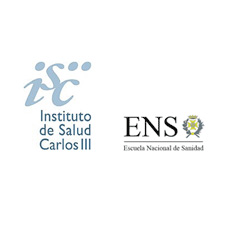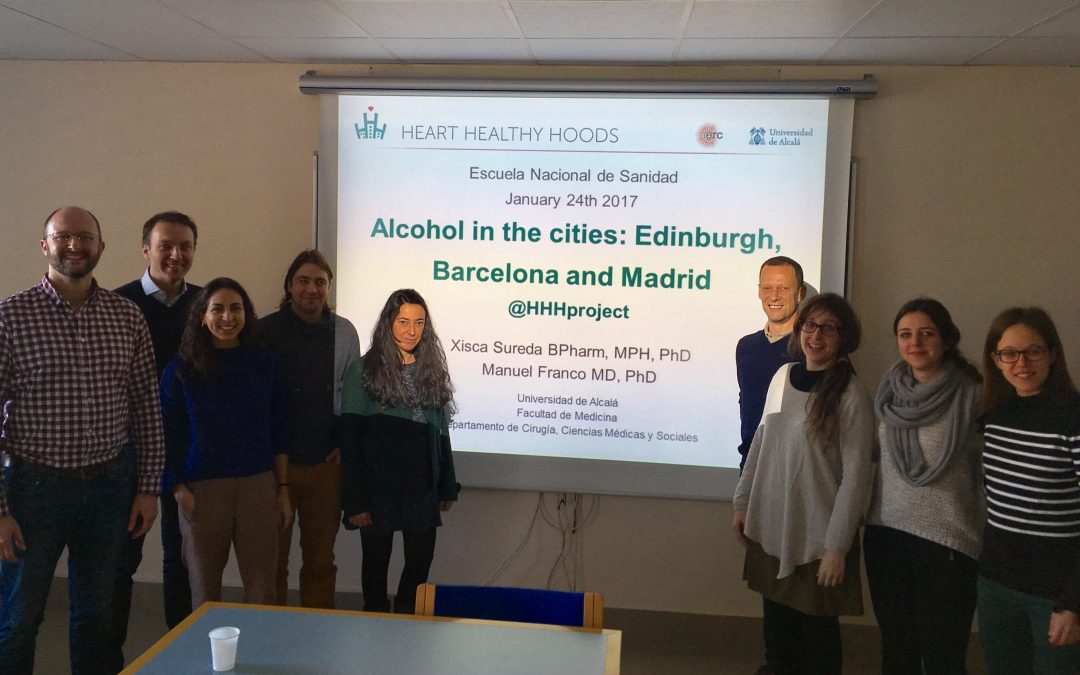
Date: January 24th, 2017
Venue: Aula 9, Escuela Nacional de Sanidad – Instituto de Salud Carlos III. C/ Monforte de Lemos 1, Pabellón 8. 28029 Madrid
Registration. Participation is free, but restricted to confirmed participants. Please contact francisca.sureda@uah.es to confirm registration.
Background and context.
Harmful use of alcohol is one of the world’s leading health risks. Europe presents the highest per capita alcohol consumption levels in the world. In recent years, there has been a growing interest in how the social, urban and cultural environments contribute to shaping health outcomes and behavioral risk factors associated with health. A positive association between certain characteristics of the urban environment and individual alcohol consumption has been documented in research. Within the European Union, policies regulating the alcohol retail environment, marketing and advertising of alcohol vary across countries, and sometimes across jurisdictions within a country, with different levels of restrictions. The pervasiveness of alcohol products in our urban landscape may have favored the normalization of alcohol consumption with disproportionate implications to those who are constantly exposed to a wide variety of alcohol products and advertisements.
Researchers in Madrid and Barcelona are conducting a coordinated project to characterize the alcohol urban environments and its regulation. Moreover, these groups want to explore how these environments relate with alcohol use. Both groups collaborate with the Center for Research on Environment Society and Health (CRESH) and the University of Edinburgh, and are part of active networks involved in the prevention of harmful alcohol consumption in Spain.
Objectives.
The main objective of the seminar is to share the framework and methods of the projects conducted in Barcelona, Madrid and Edinburgh, to identify options to collect similar comparable information from diverse settings, and to strength the collaboration between different international researchers in the field.
Agenda:
10.30-10.45. Welcome to participants, review of scope and objectives
10.45-11.30: Jamie Pearce. Alcohol outlet density, health inequalities and policy translation:
findings from the UK. Clic here to see the presentation in pdf format
11.30-11.45: Discussion
11.45 – 12.15. Break
12.15-12.45: Xisca Sureda, Manuel Franco. The relationship of high alcohol use and the alcohol urban context, including the implementation of regulatory policies. Heart Healthy Hoods mixed methods (environmental mapping, cohort study, and Photovoice). Clic here to see the presentation
12.45-13.15: Marina Bosque. The availability, accessibility and visibility of alcohol and its marketing in the urban environment and its influence in teen-age drinking. Clic here to see the presentation
13.15-13.45 Joint discussion
13.45-14.00: Closing remarks
Summary and Conclusions:
The seminar on alcohol and urban environments was held at the “Escuela Nacional de Sanidad” in Madrid, organized by the University of Alcalá/Heart Healthy Hoods (HHH) project, with the participation and support of the Agència de Salut Pública de Barcelona and the “Grupo de Trabajo sobre Alcohol de la Sociedad Española de Epidemiología”. Twenty professionals participated, from various institutions in Madrid, Barcelona and Edinburgh. Presentations and discussions focused on the presence of alcohol in the urban environment and its influence on consumption and health impact. Dr. Jamie Pearce from University of Edinburgh (ERC Starting Grant holder) presented on UK findings. Drs Xisca Sureda and Manuel Franco (also ERC Starting Grant holder) presented on the HHH advances. Drs Bosque and Espelt presente don Barcelona experience.
In Spain, data show that despite the decline in annual alcohol consumption per capita, there is an increase in episodes of intensive consumption and intoxication, especially among adolescents and young people. This changing pattern could be partly explained by changes in the supply and availability of alcohol, its relative low costs, and the intensity of advertising and promotion of alcoholic products.
Researchers at the seminar found that despite the existing data collection systems, there is no reliable information on alcohol supply or advertising pressure, nor on the level of compliance with the regulation (local, regional and general). Throughout the seminar, ongoing research projects in the cities of Edinburgh, Barcelona and Madrid, were presented with emphasis on the methods they will use to describe alcohol environment in terms of availability, promotion and signs of consumption, and to understand the attitudes and practices in relation to the harmful use of alcohol. Researchers reviewed the applicability of methodologies such as concept mapping, photovoice, or geospatial analysis applied to this field, emphasizing the relevance of mixed-methods approaches to understand a complex problem like this. Results of these projects will help understanding the association between alcohol urban environment and alcohol drinking behaviors. In addition, the results obtained will be used to evaluate and design policy interventions for the prevention of excessive alcohol consumption.
Throughout the meeting, there was a broad consensus on the relevance of translating scientific knowledge into recommendations and policies for our different cities. Research that goes from local to global is key in this area. Research projects that start at the local should be compared to other cities worldwide to facilitate estimating the association between alcohol urban environment and alcohol behaviors, and to design and evaluate alcohol policy interventions. Participants reinforced the need for greater international research collaboration, and the importance of communication and dissemination of the results to reach different audiences including citizens, the scientific community, and different level policy makers.
Organization: Heart Healthy Hoods project, University of Alcalá
Supported by: Escuela Nacional de Sanidad – Instituto de Salud Carlos III, Universidad de Alcalá, Agència de Salut Pública de Barcelona and Sociedad Española de Epidemiología. The research projects are financed by the Plan Nacional sobre Drogas (2016I047 and 2016I029), and the European Research Council (FP7/2007-2013/ERC Starting Grant HeartHealthyHoods Agreement n. 336893).



